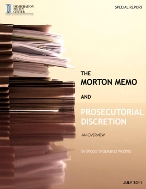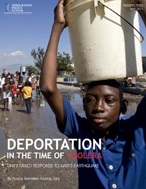Committee to Take Up Reps. Smith and Goodlatte's Restrictive Immigration Bills
Released on Wed, Jul 13, 2011
Washington, D.C. – Tomorrow, the House Judiciary Committee is scheduled to take up two immigration bills that supposedly address community safety, but in reality are simply the latest attempts to restrict immigration and limit due process for immigrants. Neither Chairman Lamar Smith’s (R-TX) “Keep Our Communities Safe Act of 2011,” or Rep. Bob Goodlatte’s (R-VA) “Security and Fairness Enhancement for America Act of 2011” (SAFE Act) offer solutions to the immigration crisis. Instead, Chairman Smith’s bill would authorize indefinite detention for a wide range of immigrants, while Rep. Goodlatte’s bill would eliminate the diversity visa—a lottery that offers 50,000 visas per year to immigrants from countries that send few people to the U.S. Once more, the House Judiciary Committee is using fear to restrict our immigration system.
While studies have repeatedly shown that immigrants are less likely to commit crimes than native-born Americans, “The Keep Our Communities Safe Act of 2011” attempts to exploit the public’s fear of crime to advance an anti-immigration agenda. The bill would expand the authority of the Department of Homeland Security (DHS) to subject certain immigrants to indefinite—that is, potentially life-long—detention, even though the Supreme Court has held that such detention raises serious constitutional concerns. The bill relies on the continued detention of immigrants—many of whom have never committed a crime—as a stand-in for fixing the underlying problems of our broken immigration system. Similarly, the deceptively titled SAFE Act simply eliminates 50,000 visas that currently go to immigrants from many countries in Africa and elsewhere that have less of a tradition of immigrating to the U.S.
Mary Giovagnoli, Director of the Immigration Policy Center, noted:Read more...
View Release





